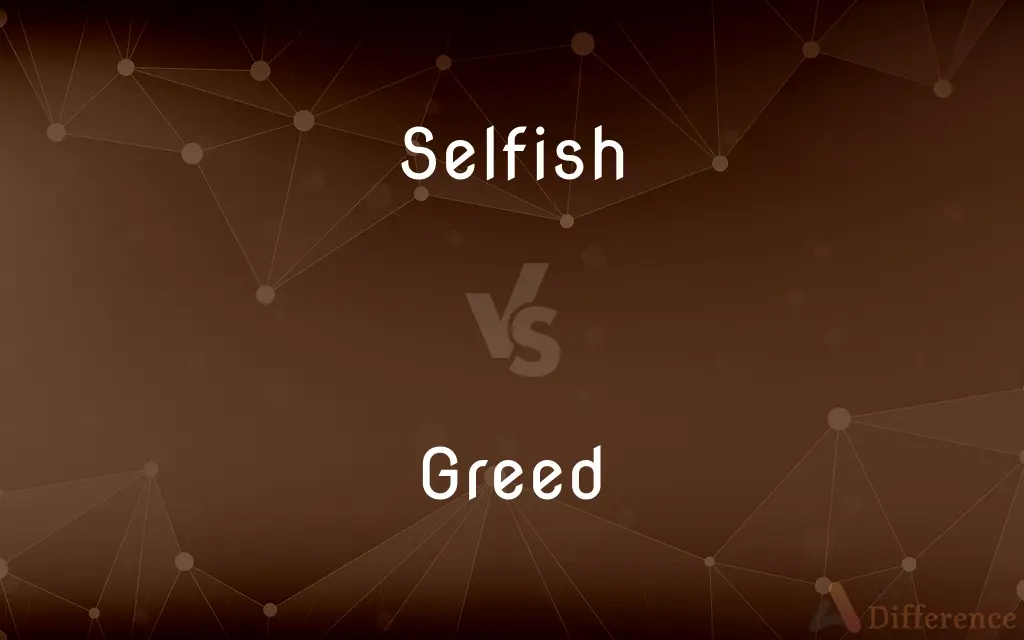Selfish vs. Greed — What's the Difference?
Edited by Tayyaba Rehman — By Maham Liaqat — Updated on April 8, 2024
Selfishness is about prioritizing one's needs over others', while greed involves an intense and excessive desire for more, especially wealth or possessions.

Difference Between Selfish and Greed
Table of Contents
ADVERTISEMENT
Key Differences
Selfishness is characterized by a focus on one's own needs and desires, often at the expense of others. Individuals who are selfish prioritize their own well-being, comfort, and interests. Whereas, greed goes beyond self-interest to an excessive desire to acquire more than one needs, particularly in terms of wealth, resources, or possessions. It is not just about prioritizing oneself but about accumulating excessively.
Selfish individuals may not always seek to accumulate more but rather ensure their own needs and desires are met first, even if it means neglecting the needs of others. On the other hand, greedy people are driven by the insatiable need to acquire more, often displaying little concern for the means by which they achieve their ends or the impact on those around them.
While selfishness can manifest in everyday actions and decisions, impacting interpersonal relationships and social dynamics, greed often has broader implications, affecting economic, social, and environmental spheres. Greedy behaviors can lead to unethical practices, exploitation, and significant inequalities.
Both selfishness and greed can stem from a fear of not having enough or a desire to feel superior to others. However, greed is typically more associated with materialism and the pursuit of wealth, whereas selfishness is a broader trait that can involve any prioritization of one's own needs or desires.
In considering the consequences, selfishness can erode trust and cooperation in relationships and communities, leading to isolation and conflict. Greed, however, can have more far-reaching consequences, including economic instability, environmental degradation, and societal unrest, reflecting its more intense and expansive nature.
ADVERTISEMENT
Comparison Chart
Definition
Prioritizing one's own needs over others'.
Excessive desire for more, especially wealth or possessions.
Focus
Personal well-being and interests.
Accumulation of wealth, resources, or possessions.
Manifestation
Everyday actions and decisions.
Broader economic, social, and environmental impacts.
Root Cause
Desire to ensure one's own comfort and well-being.
Insatiable need to acquire more than one needs.
Consequences
Erodes trust and cooperation, leading to conflict.
Leads to unethical practices, exploitation, and inequalities.
Compare with Definitions
Selfish
Concerned chiefly or only with oneself.
He refused to share the last slice of pizza, showcasing his selfish nature.
Greed
Requires awareness and a shift towards generosity.
Realizing his greed, he donated half his wealth to charity.
Selfish
Exhibits lack of consideration for others.
Her selfish behavior at work meant taking credit for others' efforts.
Greed
Intense and selfish desire for wealth, power, or food.
The corporate executive's greed drove him to exploit his workers.
Selfish
Can be mitigated through empathy and altruism.
Recognizing his selfish ways, he volunteered at the local shelter to give back.
Greed
Leads to accumulation beyond need or use.
Her greed was evident in her vast, unused collection of designer clothes.
Selfish
Can harm relationships through neglect or insensitivity.
His selfish decision to prioritize work over family time strained his marriage.
Greed
Associated with moral and ethical corruption.
The community condemned the politician's greed for land and power.
Selfish
Often viewed negatively in social contexts.
Her classmates found her selfish for not participating in group projects.
Greed
Can contribute to economic and social inequalities.
The billionaire's greed was criticized during the economic downturn.
Selfish
Concerned chiefly or excessively with oneself, and having little regard for others
A selfish child who wouldn't share toys.
Greed
Greed (or avarice) is an uncontrolled longing for increase in the acquisition or use of material gain (be it food, money, land, or animate/inanimate possessions); or social value, such as status, or power. Greed has been identified as undesirable throughout known human history because it creates behavior-conflict between personal and social goals.
Selfish
Showing or arising from an excessive concern with oneself and a lack of concern for others
A selfish whim.
Greed
Intense and selfish desire for something, especially wealth, power, or food
The colonists' greed for African land
Mercenaries who had allowed greed to overtake their principles
Greed has taken over football
Selfish
The present quote doesn't illustrate the meaning very well.Holding one's own self-interest as the standard for decision making.
Greed
An excessive desire to acquire or possess more than what one needs or deserves, especially with respect to material wealth
"Many ... attach to competition the stigma of selfish greed" (Henry Fawcett).
Selfish
Having regard for oneself above others’ well-being.
Greed
A selfish or excessive desire for more than is needed or deserved, especially of money, wealth, food, or other possessions.
His greed was his undoing.
Selfish
(video game characters) Relying on their own actions and capabilities to be effective in the game, rather than on other characters.
Greed
To desire in a greedy manner, or to act on such a desire.
Selfish
Caring supremely or unduly for one's self; regarding one's own comfort, advantage, etc., in disregard, or at the expense, of those of others.
They judge of things according to their own private appetites and selfish passions.
In that throng of selfish hearts untrue.
Greed
An eager desire or longing; greediness; as, a greed of gain.
Selfish
Believing or teaching that the chief motives of human action are derived from love of self.
Hobbes and the selfish school of philosophers.
Greed
Excessive desire to acquire or possess more (especially more material wealth) than one needs or deserves
Selfish
Concerned chiefly or only with yourself;
Selfish men were...trying to make capital for themselves out of the sacred cause of civil rights
Greed
Reprehensible acquisitiveness; insatiable desire for wealth (personified as one of the deadly sins)
Common Curiosities
Can selfishness ever be positive?
In moderation, prioritizing oneself can be healthy, ensuring personal well-being and self-care.
How can one overcome selfishness?
Overcoming selfishness involves developing empathy, practicing altruism, and focusing on the needs and well-being of others.
What are the signs of greed in an individual?
Signs include an excessive pursuit of wealth, insensitivity to others' needs, and hoarding of resources.
How does greed affect society?
Greed can lead to economic disparities, exploitation, environmental damage, and societal unrest.
How do selfishness and greed impact personal relationships?
They can erode trust, lead to conflict, and result in a lack of meaningful connections.
Why is greed considered a deadly sin?
Greed is a deadly sin because it signifies an insatiable and morally corrupt desire for excess, leading to harm and injustice.
Is it possible to be greedy for things other than money?
Yes, individuals can exhibit greed for power, attention, or even knowledge, always wanting more than they need.
Can greed ever be justified?
While ambition can be positive, greed is rarely justified as it involves harming others for personal gain.
How does one distinguish between need and greed?
Need refers to essentials for well-being, while greed seeks excessive accumulation beyond necessity.
What defines a selfish person?
A selfish person is someone who consistently prioritizes their own needs and desires over those of others.
Can society function without any selfishness or greed?
A balance of self-interest and altruism is necessary for society's functioning; excessive selfishness or greed disrupts harmony.
What motivates greedy behavior?
Factors include fear of scarcity, desire for power, societal values emphasizing material success, and personal insecurities.
What is the difference between being ambitious and being greedy?
Ambition drives one to achieve goals within ethical bounds, while greed disregards morality for personal or material gain.
How do cultural perceptions of selfishness and greed differ?
Cultural norms influence the acceptance of selfish or greedy behaviors, with some societies valuing community over individual gain.
Share Your Discovery

Previous Comparison
Lysosome vs. Vacuole
Next Comparison
Relapse vs. RecurrenceAuthor Spotlight
Written by
Maham LiaqatEdited by
Tayyaba RehmanTayyaba Rehman is a distinguished writer, currently serving as a primary contributor to askdifference.com. As a researcher in semantics and etymology, Tayyaba's passion for the complexity of languages and their distinctions has found a perfect home on the platform. Tayyaba delves into the intricacies of language, distinguishing between commonly confused words and phrases, thereby providing clarity for readers worldwide.













































